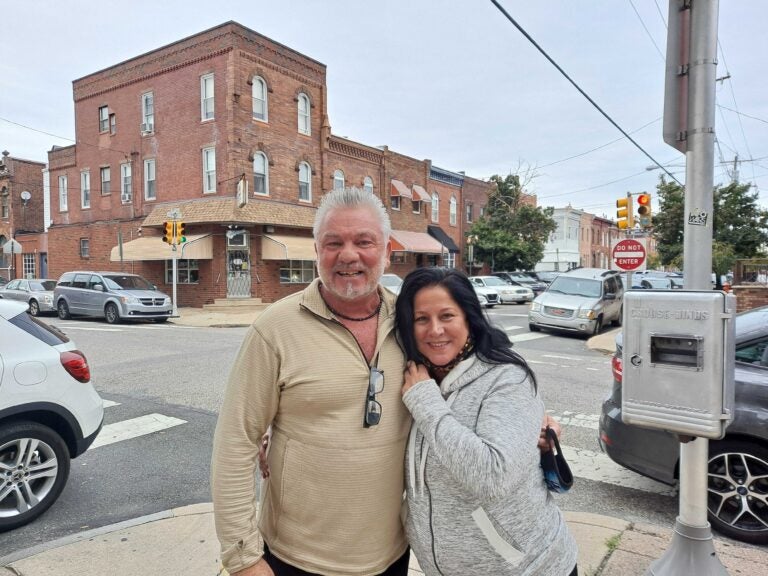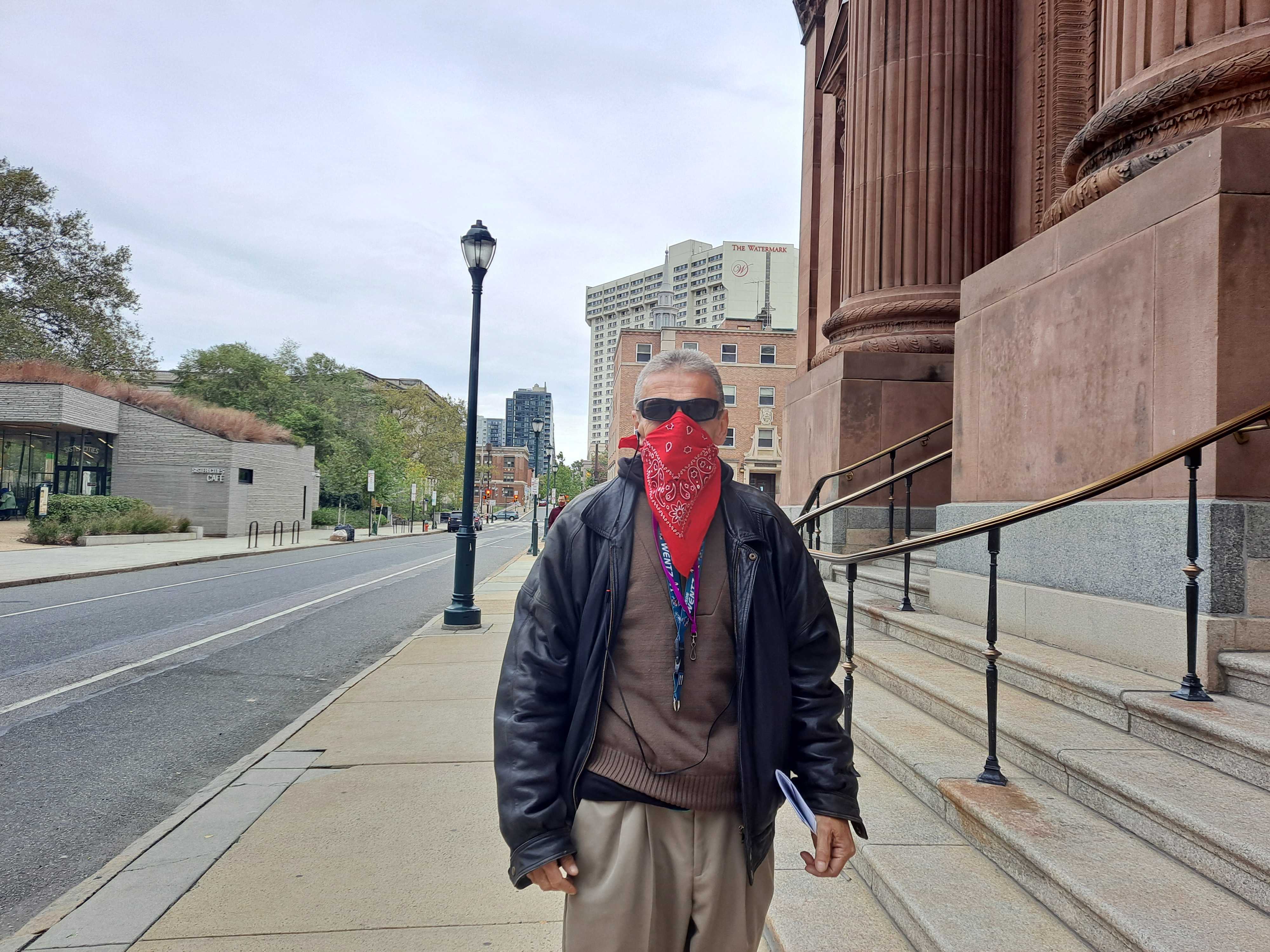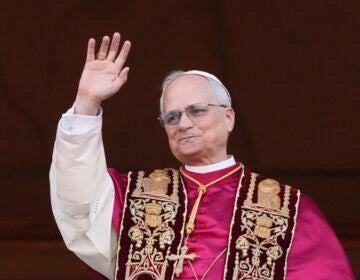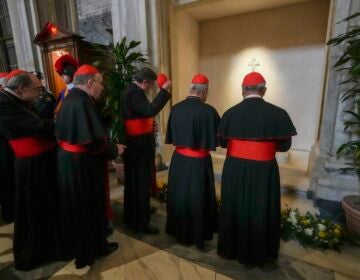Philly Catholics process pope’s call for legal protections of same-sex unions
Some of the Philly area’s 4 million Catholics say it’s “long overdue,” and a reflection of the church’s teaching on the “dignity of the human person.”

Patrick Grubb and Ramona Pellerito outside Saint Monica Parish in South Philly. (Ximena Conde/WHYY)
Michael McQueen grew up in the Southern Baptist church believing, as a young gay man, that he would go to hell.
But while attending Catholic school, McQueen said he learned he could be himself and be religious, so long as he remained celibate.
He converted to Catholicism at 18 and went on to study theology at St. John’s University, even considering a vocation to the priesthood at one time.
Still, McQueen, now 30, has always struggled with the church’s stance on LGBTQ issues. As recently as 2003, the church held a position that emphasized respect for homosexuals, but warned against approving “homosexual behavior” or offering legal recognition to “homosexual unions.”
McQueen, who co-chairs a group called OUT Catholics of Philadelphia, received a glimmer of hope that one day theology could catch up with modern views when Pope Francis’ call for laws allowing same-sex civil unions became public this week.
“Homosexuals have a right to be a part of the family. They are children of God and have a right to a family,” said the pope in “Francesco,” a new documentary that debuted Wednesday at a film festival in Rome.
The remarks have stirred conversation among Catholic communities — with some saying the pope’s comments don’t go far enough and others concerned that he has sown confusion about what the church teaches.

McQueen, one of the more than 4 million Catholics in the five-county region, admits the pope’s comments don’t affect the tenet that marriage in the church is between a man and a woman. It’s a point the Archdiocese of Philadelphia reiterated in a statement last week in response to Pope Francis’ statements.
“It is important to note that the remarks appeared in the context of a film and not a church teaching document,” read the statement, which was not directly attributed to Philadelphia’s new Archbishop Nelson Pérez.
“The Holy Father has consistently affirmed the sacrament of marriage as a union between one man and one woman on many occasions just as he has affirmed the need to treat all people with respect and dignity.”
Pittsburgh Bishop David A. Zubick echoed that statement in comments to America magazine, saying the pope’s remarks do not reflect “a departure from the teaching of the Catholic Church concerning marriage or homosexuality.”
But even with no mention of theology or marriage within the church, McQueen said the pope’s comments were, at the very least, a sign of progress.
“I think it’s a very radical step and I think it starts at that basis of the dignity of the human person … and I really believe that as the church honors the dignity of the human person and sees the image of God in every person no matter what their sexual orientation, their gender identity, that we’ll see the theology slowly come along with that,” said McQueen. “But for now, I think this is a tremendous step coming from the Holy Father.”
Coming out of Sunday mass at Saint Monica Parish in South Philly, Ramona Pellerito, a lifelong Catholic raised in the neighborhood, only had one thing to say.
“I think it’s long overdue,” she said. “They should be acknowledged like everyone else.”
Pellerito’s husband, Patrick Grubb, acknowledged not everyone in the church would be comfortable with the pope’s comments, but he added most of the Catholics he knows agree that not only should members of the LGBTQ community be given basic rights outside of the church, they should be able to worship and love within the church.
“If you want to be a true Christian, then you must accept everyone, as long as they want to be involved in our religion and be involved in our church and be a Christian, a good Christian,” said Grubb.

At the Cathedral Basilica of Saints Peter and Paul in Center City, Patrick Smith was the only churchgoer on Sunday who was comfortable enough to talk to a reporter on the record about the pope’s comments. Smith said same-sex couples can be found all across Philadelphia, so why not give them some legal protections?
“I’m not judging them,” said Smith, adding he’d also be comfortable seeing them in church.
But Bill Donohue, president of the Catholic League, a conservative group, told NPR the pope’s comments could “be greeted with a great deal of mass confusion on the part of the laity,” expressing concern over the “lack of clarity” in the remarks.
No matter where the Catholic church goes from here, the LGBTQ community continues to fight for basic rights in the U.S.
In 2013, the U.S. Supreme Court struck down the federal Defense of Marriage Act defining marriage as between one man and one woman, and ruled that all 50 states could not keep same-sex couples from marrying two years later.
The high court ruled in June that the Civil Rights Act protects LGBTQ people from discrimination on the job. However, many states, including Pennsylvania, still do not outlaw discrimination against LGBTQ people in matters of housing, employment or public accomodation.
On Nov. 4, the court will hear another case, this time from Philadelphia that will affect LGBTQ communities.
The case Fulton v. City of Philadelphia will determine whether private agencies getting taxpayer dollars can use their religious beliefs as grounds to refuse LGBTQ communities in homeless shelters or foster care settings.
While McQueen acknowledges Pope Francis’ newly public statements do not change the church’s current teachings, he thinks they make a good case for the separation of church and state in these matters.
“I don’t really see [his comments] as a changing of the church and I think that’s very intelligent of why he stated it the way that he did,” said McQueen, “because now we’re not talking about the sacrament of marriage, now we’re not talking about theology. We’re talking about peoples’ basic human rights.”

Get daily updates from WHYY News!
WHYY is your source for fact-based, in-depth journalism and information. As a nonprofit organization, we rely on financial support from readers like you. Please give today.







